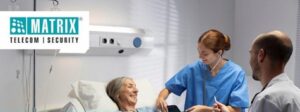
The institute encountered significant challenges stemming from the absence of CCTV cameras and a video management system. This jeopardised patient and staff safety, impeded equipment protection, compromised data integrity in research, posed regulatory compliance risks, and heightened liability concerns in the absence of visual records for verification.
Further, the client faced a significant challenge in efficiently managing attendance for staff working in multiple shifts. With an extensive workforce, manual tracking became cumbersome, leading to operational inefficiencies. To address this issue, the client sought a solution to streamline attendance management while ensuring accuracy and convenience for employees.
Challenges
Patient and Staff Safety Concerns: The absence of CCTV cameras hindered staff and patient safety. This also led to delays in assistance or emergencies going unnoticed.
Equipment Protection: The absence of a video management system made it difficult to monitor and protect expensive research machinery and medical equipment from damage, theft, or misuse.
Data Integrity Concerns: Lack of surveillance compromised the integrity of research data, as there were no visual records of experiments or laboratory procedures.
Regulatory Compliance Challenges: The institute faced regulatory compliance hurdles, including data security, patient safety, and privacy standards, risking penalties or sanctions due to inadequate surveillance measures.
Liability Risks: The absence of surveillance could increase the hospital’s liability in case of accidents or incidents, as there would be no visual records to verify events or actions taken.
Lack of Efficient Attendance System: The absence of a streamlined system for attendance management created operational challenges, making it difficult to maintain accurate and up-to-date attendance records.
Challenges with Diverse Shifts: Managing a workforce with diverse shift patterns posed specific challenges, requiring a tailored solution to address the complexities associated with varying work schedules. The client also needed help in effectively monitoring the attendance of staff members working in multiple shifts, pioneering operational inefficiencies.
Need for Facial Recognition: The client sought a solution that utilised face recognition as a credential for attendance marking, emphasising the need for a secure and convenient method to track staff attendance.
A total of 200 Matrix 5MP Dome Cameras with audio support were strategically installed indoors at the institute, covering patient wards, operation theatres, reception areas, treatment rooms, waiting areas, administrative offices, and laboratories. This ensured continuous monitoring of patient and staff activities and adherence to protocols. Outdoors, 200 Matrix 5MP Bullet Cameras were deployed at entrances, exits, parking lots, outdoor pathways, emergency exits, and long corridors. This enhanced perimeter security, and monitored visitor and vehicle traffic.
Centralised video surveillance of all the cameras was achieved with Matrix SATATYA SAMAS – Video Management Software, along with four CAM100 licences for seamless integration and control of all 400 cameras. The institute opted for a USER3 licence which allowed three users to efficiently manage live feeds, review footage, and perform critical tasks from a centralised location.
Furthermore, in the realm of time attendance, the absence of an efficient attendance system led to operational challenges, prompting the adoption of a server-based solution with automated reporting capabilities and centralised data storage. Managing a diverse workforce with varying shift patterns was tackled through a tailored workforce management system with scheduling capabilities.
The client faced challenges in monitoring staff attendance, particularly for those in multiple shifts, causing operational inefficiencies. To address this, the Matrix Time-Attendance system was implemented for real-time monitoring and reporting across diverse schedules. A labour-intensive process of manually tracking attendance for varied shifts was streamlined through a comprehensive Attendance Management System, reducing manual efforts and enhancing overall efficiency.
Recognising the importance of secure and convenient attendance tracking, the client implemented a Facial Recognition Attendance System with 25 Nos of Matrix COSEC ARGO FACE, integrating biometric technology for enhanced accuracy and security. This fulfilled the client’s need for a secure method of attendance marking, successfully addressing specific challenges and optimising overall workforce management.
Benefits
● The Cameras with Motorised Varifocal Lens enabled the ability to remotely adjust focal length and zoom, allowing the capture of detailed images over varying distances in the institute.
● With the help of user-defined roles and rights, administrator, operator, and viewer rights were given which enhanced security, as only designated officials could access the footage.
● The E-map monitoring feature in SAMAS allowed the users to navigate between various buildings, floors, and cameras, facilitating easy centralised video surveillance throughout the campus premises.
● Camera Grouping, Page Sequencing, and Window Sequencing in SAMAS made it very easy to manage such a large number of cameras.
● The Interactive Smart Client in SAMAS allowed for Quick Investigation. Video Footage could be easily bookmarked, and exported as required.
● Reduced manual efforts with a comprehensive Attendance Management System leveraging advanced software.
● Enhanced operational efficiency through automated attendance tracking for diverse shift schedules.
● Streamlined data collection and reporting, improving overall efficiency in attendance management.
● Improved accuracy, reliability, and security in attendance tracking with Face Recognition based biometric technology.











